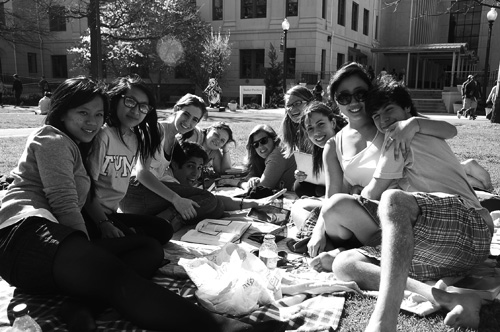Too many girls? College gender ratio

Females outnumbering males occurs everywhere at AU: at clubs, fraternity parties and in classes. With more females in college than ever before, men seem to be scarce. This is especially true on campus where 65 percent of the student body is female, according to a 2007 statistic from the school.
“I [went to fraternity parties] as a freshman but not really anymore, because you don’t really get anything out of it. It’s really boring now,” Sindwani said. “No one seems interested in a genuine platonic friendship.”
In fact, Sindwani says she doesn’t have any male friends at AU, “except my friends’ boyfriends,” she adds. In her hometown of Philadelphia, Sindwani had several males she considered best friends. However, since coming to AU she has lost an equal balance between her female and male friends. Most of Sindwani’s classes are filled with girls, except for those in the business school. Even her business classes, though filled with men, divide into cliques. She identifies them by fraternity, since most males at AU participate in Greek life.
Her theory for the high number of men in Greek life is that most want to find like-minded male friends. “Fraternities control the social scene at AU; it’s one of the best ways to meet people,” senior Bob Vitas ag said. Though he was already on the rowing team, Vitas joined Sigma Chi his freshman year for the brotherly community.
Carmen Rios, a sophomore, is the Director of the Rape Awareness and Eradication Department and Chairwoman of the new campaign for consent on campus, titled (con)sensual. Rios described Vitas’ experience as a cultural aspect of AU. “The culture at AU forces straight males to use frats as a safe space for themselves. I feel like it’s probably really hard to be a straight male at a social justice campus and still get your bro-ing in.”
As a literature and international studies major, Vitas said he has experienced the female-dominated gender ratio in the classroom. Christina Hoff Sommers, a self-described libertarian equity feminist, discussed the reasoning for Vitas’ problem in her 2000 book, “The War Against Boys: How Misguided Feminism is Harming Our Young Men.” Notably, the book criticizes too many skewed surveys regarding female intelligence and ambition as partially the reason why Vitas finds himself the only male in classes. She says men are just not enrolling in college in large numbers any longer.
“Boys dominate dropout lists, failure lists, and learning-disability lists. Students in these groups rarely take college-admissions tests. On the other hand, the exceptional boys who take school seriously show up in disproportionately high numbers for standardized tests,” Sommers said in “The War Against Boys.” She blames misrepresented scores on this phenomenon.
Sommers argues that many girls are encouraged to take standardized tests, while fewer boys receive the same attention. Still, she says the boys who do take the SAT do exceptionally well. This is evidenced by surveys that point to the overall higher academic performance of boys. Ten years after the book’s publication, colleges are witnessing the ranks of female college applications swell across the country.
Despite smaller numbers, men are doing fine socially. They are able to find fraternities or clubs where they can find other like-minded males. Kathleen Bogle is a sociologist at La Salle University in Philadelphia and commented on the social consequences of fewer men on campus. Bogle said because they are becoming a minority, men are allowed to control socially what happens at colleges. This includes where girls go on weekends as well as what they do sexually — otherwise known as hooking up.
“There could be a feeling [among girls] that ‘If I don’t do x, y, and z with them, somebody else will,’” said Bogle, who recently published Hooking Up: Sex, Dating, and Relationships on Campus. “Girls will do more than they’re comfortable with to lock it down.”
Bogle has seen that with fewer men on campus, female competition can take different forms. While sexual competition is always prevalent, Bogle claims girls tend to feel they should dress well at all times to attract men. She said the pressure to be “on,” to constantly look physically attractive, can be emotionally wearing for girls who would otherwise dress with a more relaxed style in a college setting. Bogle called this the “fishbowl feeling,” a feeling of being constantly watched. The need to be seen as attractive at 3 a.m. while studying in the library is just one form of female competition in the female-dominated college atmosphere.
Rios also discussed the implications of hookup culture at AU. “It has definitely been constructed over the course of a long period of time to give preference to masculinity.” Rios said men often take advantage of hookup culture to prove their masculinity. While men are taught to accrue large numbers of hookups in college, women are taught the exact opposite throughout their lives.
Bogle’s book said that though seeing an ex-hookup can be potentially awkward, it does not provide an enduring social damper. Even on a small campus, Bogle said those she interviewed replied that it did not make a difference. “Everyone worries about that, but, I mean, it’s not the end of the world,” she said. Vitas agrees. “If you’re mature and they aren’t, it sucks. Because they’ll make it awkward in ways that you probably couldn’t have imagined,” he said.
Sindwani said not being involved in Greek life might explain her dearth of male friends. As she was applying to college, Sindwani said she was very much aware of the gender imbalance. “You don’t want to choose a school because there aren’t guys,” Sidwani said. “But it feels like something’s missing.” Rios agreed. “I’ve often wondered where they [males] are and I’ve been told that they’re in Greek life. That’s where they’re hiding,” Rios said.











